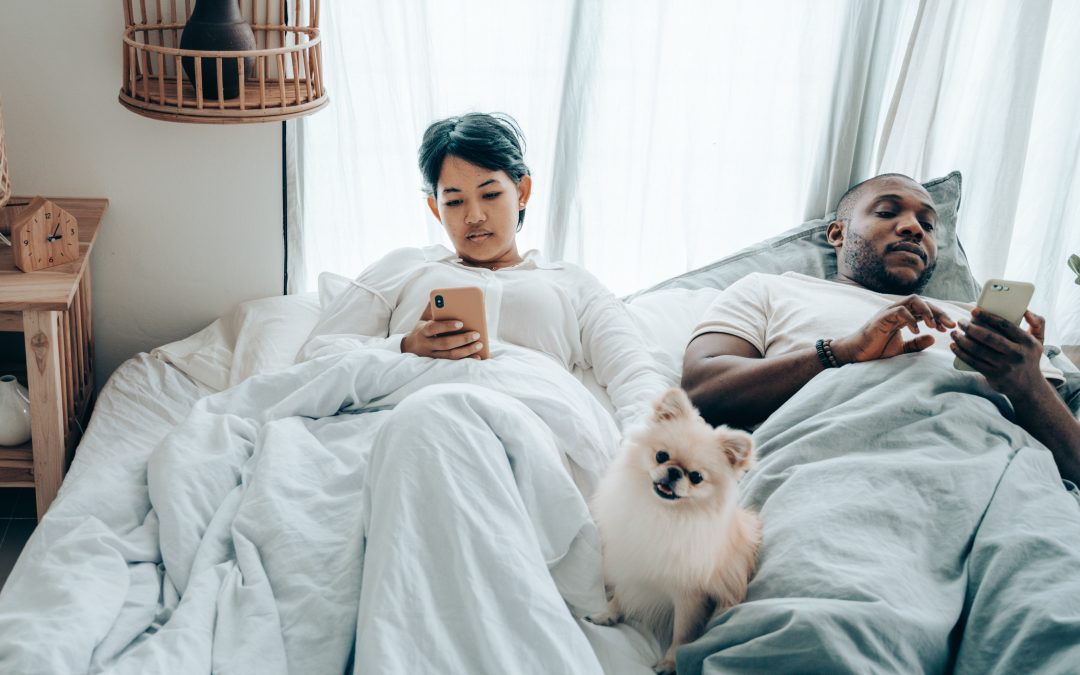Are you too attached to your phone? Or even addicted? I know I am! So I’m writing this blog in hopes that it will not only help you, but help me. When I take the time to creatively brainstorm on things (something I’m really good at) I can usually come up with some good solutions.
Test if you are addicted. Then, check out ideas for spending less time on phone including turning off notifications, best times to turn it off/leave it behind, how to use DO NOT DISTURB, remove/hide apps, apps to control screen time, and changing habits.
This is a bit off the beaten path from my normal topics that are more directly related to chronic illness, but this is definitely a wellness topic. There are many benefits of spending less time on your phone. It is healthier for our society to live more in the present moment, not to text and drive, not be distracted from our relationships with friends and family, be wasting our time on pointless videos and articles, and not be so distracted in general.
Just a Reminder: Blog does contain Affiliate links. If you buy something, I’ll possibly make a small commission from it, but at no additional cost to you.
My Relationship with My Phone
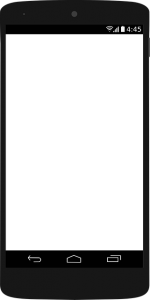 Hopefully you can relate… I’m addicted to my phone and I know it! Now there are different levels of addiction so don’t judge me too harshly. I would say I’m not the worst but I’m certainly not an example of someone with a healthy relationship with their phone either. It is something that I could use some work on and I honestly want to be better.
Hopefully you can relate… I’m addicted to my phone and I know it! Now there are different levels of addiction so don’t judge me too harshly. I would say I’m not the worst but I’m certainly not an example of someone with a healthy relationship with their phone either. It is something that I could use some work on and I honestly want to be better.
First off, I don’t like it when my brain gets bored. I will often randomly check my phone when I’m out to eat. The person I’m with will leave to go to the bathroom and I will randomly look at my phone. I check my phone when I’m waiting in lines, and in many other situations – more then I care to admit.
I’m not so bad where I don’t engage in conversation with the person I’m with. However, sometimes conversations spark a thought around something “I feel” I need to research on my phone, or check my calendar about. But I really don’t need it!
I RESISTED BEING ADDICTED – BUT I FAILED!
Even though I am considered a mild addict, I still want to improve! Even though I’m kind of addicted to my phone, I was always resistant and the last one among my peers to jump on the train with the new phone changes. When everyone was excited to be texting, my response was “really? can’t I just call?” I was the last one among my peers to get a text plan, the last one to get the fancy texting keyboard, and just about the last one to get a phone with internet on it. It wasn’t about the price for me. I knew then what was going to happen. I knew then my phone was going to become a greater part of my life.
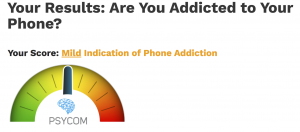
TEST YOUR ADDICTION HERE: Are You Addicted to Your Phone?
As I mentioned in my newsletter briefly, I was not a huge fan when phones got cameras and had music on them too. It was easier to spend time away from my phone when I had a separate camera and an iPod for music. I knew it was going to be a problem. Now my phone is always close by and with me wherever I go.
But yeah I love my phone! I love now that from one device I have access to music, a camera, internet, messaging, calls, my calendar, my alarm, and of course my GPS! I don’t know how to live without my GPS, calendar, or my alarms – those are life savers (let’s be honest I can’t live without 90% of the features)! But I still don’t love being so attached to it.
Why is Less Screen Time Beneficial to Our Health?
- It can change our brain – kill our attention span, mess with our memory, and more.
Preliminary data from an Adolescent Brain Cognitive Development (ABCD) study found that increased screen time, including time spent on cell phones, is not just bad for the brain but can affect a child’s psychology, thinking patterns, sleep cycles, and behavior, shortening their attention span and potentially encouraging violent or aggressive behavior (Dr. Shaikh, 2021). - Continuous interruptions and alerts from phones are also not good for the brain. These constant alerts jolt our stress hormones into action, igniting our fight or flight response; our heartbeats quicken, our breathing tightens, our sweat glands burst open, and our muscles contract (Brueck, 2019).
Your brain also gets overwhelmed and can become lazier. Many apps can cause a person to be addicted.
- It takes us away from experiencing the world around us and being fully present in the world.
You can miss something beautiful outside, miss out on experiences, miss out on opportunities, and more, if you are too involved with your phone. - It can cause stress, anxiety, and depression
86% of Americans say they check their email and social media accounts “constantly,” and that it’s really stressing them out (Brueck, 2019). Often teens who struggle with depression check their social media accounts frequently. - It can lead to problems with our social skills and hurt our relationships.
Are you not interacting enough with the people around you? Do you not spend enough time engaging in face to face conversations with your family? - It steals our time
- It could cause an auto accident
If you need a more in-depth plan, check out this book! How to Break Up with Your Phone: The 30-Day Plan to Take Back Your Life Buy Here.
How to Use Your Phone Less
 Disconnecting from our phones can definitely be a challenge. Our phones are designed to make us addicted. Like I mentioned previously, we have everything we could possibly need on our phones. We have access to a ton of information, people, and entertainment.
Disconnecting from our phones can definitely be a challenge. Our phones are designed to make us addicted. Like I mentioned previously, we have everything we could possibly need on our phones. We have access to a ton of information, people, and entertainment.
Our phones have many awesome benefits. So the solution to being addicted is not to go phone-less. The solution is just to use the phone for better purposes, which means not wasting hours on games, videos, articles, and other apps that don’t really add much value to our lives. Even if you read lots of news stories and educate yourself on random things, it is better to live more in the real world then on your phone.
FIRST, HOW LONG DOES IT TAKE TO GET INTO A NEW HABIT?
The internet says it takes anywhere from 21 days to an average of 66 days for a new behavior to become automatic. So that means if these changes are hard for you to do – just keep on doing them and they may eventually become natural or even automatic to you.
TURN OFF Most or All Notifications
No one needs notifications for every app. Most people do not need to know every time they receive an email or something happens on social media. You know you are going to probably check it once a day anyway, or maybe more or less depending on the importance of your social media or emails. So do yourself a favor and turn off those notifications.
Last time I got a new phone it was driving me nuts with all the pop up messages and beeps. You can get email, messenger notifications, and so much more! I turned off all my email and social media notifications and now I only get text notifications. But those annoy me sometimes too.
Smart Watch?
Umm do you really need the smart watch that sends you notifications? I have Fitbit that I use just to track my steps, and I refuse to turn on notifications from my phone. I really don’t need to be that connected to my phone, know every time someone texts me, emails me, or whatever it is. I’m sorry, I don’t get it. But I guess if you only wear it for certain activities – it may make sense.
Need to know the time? Just get a regular watch and stop looking at a phone or a Smart Watch which can drag you into all sorts of other activities.
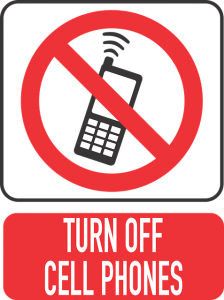 Leave it Behind or TURN IT OFF!
Leave it Behind or TURN IT OFF!
One thought I have is when you are going out to eat and you are not expecting any emergency calls, just leave the phone in the car. What if you think of something important at dinner? Carry a small notebook and jot down whatever it is and plan some phone time for it later. Your notebook could even be used for journaling or doodling in when your bored instead of scrolling social media.
Maybe we don’t need a camera or music to enjoy time at a park, time at the beach, time at a fair. Let’s just choose to enjoy the present moment and not worry about remembering it. Unless we are doing something entirely new like sky diving or hiking to the top of a gorgeous mountain for the first time, we don’t have to take a picture. Do we really need another picture of a festival we won’t remember years from now?
If you really just need something extra to keep you from your phone, this might be it. Timer Lock Container, Multi-Function Phone Time Lock Box, to Prevent Dependence on Smartphone Buy Here.
Wait…What if I want my phone for pictures or music?
Use Your: DO NOT DISTURB
We have an awesome feature on our phones to keep us from constant distractions. We can just silence our phones at random with the “DO NOT DISTURB” feature.
For Android users, swipe down from the top of the screen twice to reveal the Quick connect menu, or tap the top of the screen twice. Click the ‘Do not disturb’ button to silence all calls, texts, notifications and alarms.
For Apple users, Go to Settings > Do Not Disturb. Turn on Scheduled and set a schedule. Choose when you want to receive alerts, calls, and notifications: Silence: Choose to silence calls and notifications always or only when the device is locked.
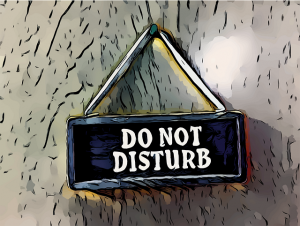
DO NOT DISTURB at Night
Look at all the options below for “DO NOT DISTURB”
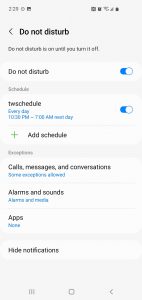 |
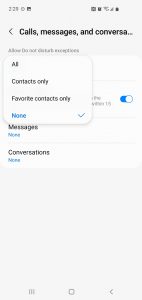 |
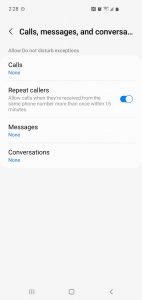 |
Remove or Hide Apps You Use Too Often
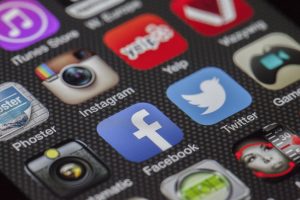 Spending Less Time on Social Media
Spending Less Time on Social Media
If you are addicted to social media and you don’t like how much time you spend on it – remove it from your phone. You can also take the icon off your home screen so that it takes you longer to find it.
Replacements
You could get a normal camera, a normal alarm clock, or listen to music from another device. Yes it will cost you money. But do you remember a time where you were just happy doing whatever you were doing without looking at your phone? Maybe experiment and keep track of how many times you touch your phone a day – it could be worse than you think.
What are You Using Your Phone For?
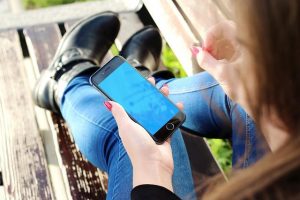
Solution? Apps to Control Screen Time
You can set time limits on apps and add passwords to help remind you that you’ve reached your maximum time limit. Some of these apps are made specifically made for kids, but what a good example that will set when you show your kids that you are using a time limit app too. 7 Apps That Help Control Screen Time
Great tips in this video too!
View All Wellness Lifestyle Blog Posts:
How an Unhealthy Spine Can Cause Numerous Problems
How Relationships Influence Our Health (in multiple ways) & Our Success
Managing 3 Stages of Stress (Conscious, Hidden Stress & Preventing It)
Cardio vs HIIT – Find out the Benefits of Both!
How Exercise Can Be Natural & Fun
Nature Heals the Soul, Calms the Mind & Restores the Body
Everything You Need to Know About Supplements
How to Sleep Better & What to do When You Can’t Sleep
Importance of Each Sleep Stage, Sleep Schedules & More
How to Increase Water Intake & Choosing Clean Drinking Water
What It Means to Live A Wellness Lifestyle & Why It Matters
Key to Wellness: Listening to Your Mind, Body, Spirit/Soul
Resources
Dr. Shaikh, Jasmine. (2021, August 4). MedicineNet/How Do Cell Phones Affect a Child’s Brain?. Retrieved from: https://www.medicinenet.com/how_do_cell_phones_affect_a_childs_brain/article.htm
Brueck, HIlary (2019, March 1). INSIDER/This is what your smartphone is doing to your brain — and it isn’t good. Retrieved from: https://www.businessinsider.com/what-your-smartphone-is-doing-to-your-brain-and-it-isnt-good-2018-3
I have a Wellness Coach Certificate, I'm an entrepreneur, an innovator, writer, and artist. My expertise includes over 7 years of marketing, research, and developing content for holistic health businesses. Plus, my own personal journey of becoming chronically sick: understanding what went wrong, and finding a way to heal and live a healthier life. I have a passion for wellness with a wealth of knowledge surrounding: wellness, flaws in healthcare, root causes for chronic illnesses, and alternative treatments.

